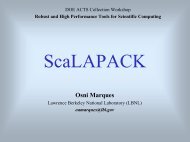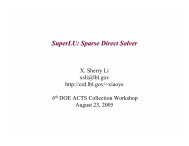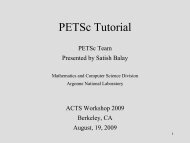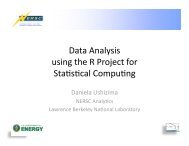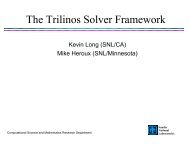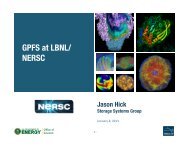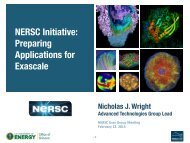Magellan Final Report - Office of Science - U.S. Department of Energy
Magellan Final Report - Office of Science - U.S. Department of Energy
Magellan Final Report - Office of Science - U.S. Department of Energy
You also want an ePaper? Increase the reach of your titles
YUMPU automatically turns print PDFs into web optimized ePapers that Google loves.
<strong>Magellan</strong> <strong>Final</strong> <strong>Report</strong><br />
processing time between tasks, this will cause load imbalance. This may dramatically impact the horizontal<br />
scalability.<br />
10.8 Summary<br />
The explosion <strong>of</strong> sensor data in the last few years has resulted in a class <strong>of</strong> scientific applications that<br />
are loosely coupled and data intensive. These applications are scaling up from desktops and departmental<br />
clusters and now require access to larger resources. These are typically high-throughput, serial applications<br />
that do not fit into the scheduling policies <strong>of</strong> many HPC centers. They also could benefit greatly from the<br />
features <strong>of</strong> the MapReduce programming model.<br />
In our early studies, Hadoop, the open source implementation <strong>of</strong> MapReduce and HDFS, the associated<br />
distributed file system, have proven to be promising for some scientific applications. The built-in replication<br />
and fault tolerance in Hadoop is advantageous for managing this class <strong>of</strong> workloads. In <strong>Magellan</strong>, we have<br />
also experimented with running Hadoop through a batch queue system. This approach can enable users to<br />
reap the benefits <strong>of</strong> Hadoop while running within the scheduling policies geared towards large parallel jobs.<br />
However programming scientific applications in Hadoop presents a number <strong>of</strong> gaps and challenges. Thus,<br />
there is a need for MapReduce implementations that specifically consider characteristics <strong>of</strong> scientific applications.<br />
For example, there is a need for MapReduce frameworks that are not closely tied to HDFS and are<br />
available to use with other POSIX file systems. In addition, MapReduce implementations that account for<br />
scientific data access patterns (such as considering data locality <strong>of</strong> multiple input files) are desired. Our early<br />
evaluation <strong>of</strong> alternate MapReduce implementations (through collaborations) shows promise for addressing<br />
the needs <strong>of</strong> high-throughput and data-intensive scientific applications.<br />
101



